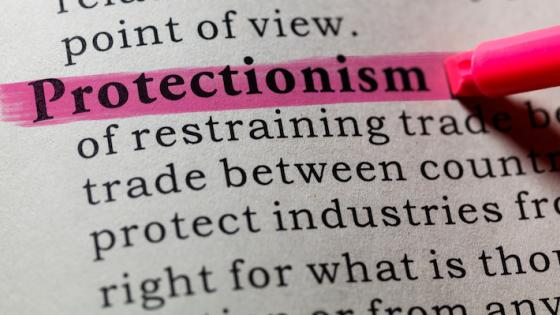First posted on:
RIETI, 28 August 2018
Protectionism is not solely attributable to economic interests
The global economy has been shaken by the protectionist measures of US President Donald Trump. Having embarked on protectionism in January 2017 by withdrawing from the Trans-Pacific Partnership (TPP) agreement, the president has apparently gone on to order a hike on tariffs to 25% imposed on $200 billion worth of Chinese goods, as reported in August 2018. In response, China hit back with plans to impose new tariffs on $60 billion worth of products made in the US. Likewise, in Europe, the UK is preparing to leave the EU amid mounting support of parties on the extreme right advocating for protectionism in respective EU nations.
Meanwhile, time and time again, empirical research in the field of economics has shown that such protectionist moves tend to dampen business conditions in the very countries implementing such policies. Based on my research findings which have been reported in RIETI columns ("Estimating the TPP's Expected Growth Effects" and "Japan Must Form a Bulwark to Protect Globalization"), as well as in the Nihon Keizai Shimbun ("Asia's Growth and Japan"), I have advocated that international trade, investment, and research provide economic benefits, and have proposed government policy recommendations in that regard.
However, it seems unlikely that protectionism will ever cease to exist. One reason is that economic benefits from globalisation are not necessarily distributed equally. In Europe and the US, protectionist measures tend to attract support from middle-class workers in the manufacturing industry in competition with imports from China which are on the rise in our increasingly global economy. In that respect, my previous RIETI column asserted that there is a need for inclusive policy encompassing initiatives to redistribute benefits emerging from globalisation.
Nevertheless, the recently intensifying trends toward protectionism seem to suggest that support for protectionist measures is not solely attributable to instances of economic loss caused by globalisation. For instance, the US government's moves to impose tariffs on Chinese goods will cause many American consumers to incur financial loss as a result of rising prices on such products. Even so, protectionist measures backed by Trump have been gaining ample support even from people involved in industries not subject to competition against China.
A large number of people in Japan as well had been adamantly against the TPP up until the agreement was signed in 2016 (before the US’ withdrawal), as public opinion at that time suggests. Those against it included not only farmers who were obviously opposed given the likelihood that the agreement would harm them directly, but also a majority of Japanese citizens employed in the manufacturing and services industries which would likely have benefited from the TPP.
Moreover, governments also vied to raise tariffs after the onset of the Great Depression in 1929 as economic blocs formed amid a climate of escalating protectionism. That situation prolonged economic stagnation post-Depression, and ultimately contributed to the rise of World War II amid circumstances of governments ceaselessly embracing protectionism.
Is insularity an inherent human trait?
It may be an inherent human trait of insularity that would explain why people might embrace protectionist measures even when those are not their best interests economically. As hunter-gatherers long ago, human beings ended up surviving despite harsh living environments. This has been the case since ancient times, tens of thousands of years ago, when people would arrange themselves into basic social units in the form of groups consisting of around 150 members who would develop strong ties in opposition against other such groups. According to evolutionary psychologist Robin Dunbar, the inherent and inevitable intolerance of human beings toward outsiders enabled them to prevail.1
Moreover, the insular nature of closed groups tends to intensify in situations where conflict with other groups forges greater solidarity among members of the group. This particular phenomenon has been empirically confirmed and observed in the fields of social psychology and behavioural economics.
One example of this was revealed in a well-known study known as the Robbers Cave Experiments which were carried out in the 1960s by a founder of modern social psychology, Muzafer Sherif.2Sherif and his team conducted the study at the Robbers Cave campsite over a three-week period during which children, the subjects of the study, were divided into two separate groups. The researchers made the two groups vie with one another through baseball games and other such competitions. This culminated in a situation within the span of two weeks where the boys had developed a sense of in-group camaraderie coupled with amplified rivalry toward the opposing group, to the extent that one group apparently ended up burning the other group's flag.
Jun Goto of Kobe University recently carried out a study that involved conducting analyses to determine how fishermen in south India have developed a sense of altruism in terms of showing feelings of compassion and consideration toward others.3 In that region, different groups of fishermen have been assigned respective sites for shrimp fishing since the 19th century, during which time records have been kept of names of members in each group, and inter-group conflicts between different groups. The study looks at altruism toward each fisherman in the region, finding that it is strong among members when their ancestors had been in conflict with another group, but weak among members when their ancestors had been in conflict mutually.
In other words, in-group bonding and out-group hostility seem to intensify in the presence of conflict against members of an out-group, and such emotions apparently carry forward to future generations. These findings suggest that the insular nature of human beings is not necessarily formed on the basis of economic rationale.
Instead, it would seem that the inherent insularity of humans gives rise to protectionist motives to close a country's borders even when doing so would be economically disadvantageous. This contrasts with progress made toward an increasingly global economy where people seeking economic benefit have been trading with different clans and ethnic groups.
Raising awareness to combat protectionism
These findings suggest that moves to combat mounting worldwide trends toward protectionism will call for efforts that help bring about change with respect to the inherent insularity of humans, above and beyond conveying economic benefits of globalisation. Difficulties of this aside, a recent study in the field of behavioural economics provides some clues. Findings gleaned in a survey of 10,000 Japanese nationals carried out by Eiji Yamamura of Seinan Gakuin University and others suggest that people who have been involved in team sports during their childhoods exhibit a greater appreciation for teamwork and are more trusting of others, and furthermore show greater support for the TPP.4 In other words, it would seem those who act as part of a group during their early childhood years and gain the experience of diligently honing their abilities in conjunction with other groups tend to develop into open-minded adults who are tolerant of others and show less reluctance toward the notion of globalisation.
This suggests that government policies supporting efforts geared to enabling children to experience the world at large could diminish protectionist tendencies over the long run, thereby facilitating sustainable economic and social development. Analyses performed by Yamamura and others seem to directly indicate a need to promote team sports for children, and it is further suggested that providing support encompassing activities to promote interaction among children, such as student exchanges across regions and countries may be effective.
This argument may not be restricted to only children. It could also be possible that adults can stave off irrational closedness by encouraging people to develop a greater understanding of others by successively exposing them to a greater diversity of experiences. In that respect, it may also be possible to help diminish protectionist tendencies through government policy support involving exchanges among different industries as well as collaborations among regions and countries and between industries and universities.
History shows that globalisation has not been monotonically expanding. For instance, both Japan and China had heavily restricted trade with the rest of the world in the medieval ages. The formation of economic blocs at the beginning of the 20th century caused worldwide trade to decrease to 5%-8% of GDP in the 1930s from 17% of GDP in 1917, which is equivalent to the level of trade in the 1970s. Thus, there is a sufficient threat that the path toward globalization could endure a setback given that protectionist agendas are seemingly gaining momentum.
As such, it is essential that we address the inherent closedness of humans and seek means of diminishing such tendencies so that humanity might continue to reap the benefits of an increasingly globalised economy. Although the studies conducted by Goto, Yamamura, and others suggest strategies in that regard, more research needs to be done in this area. Economists should take more open and interdisciplinary approaches to conduct research on this issue and propose effective measures to the society.
Figure 1 Worldwide exports prior to World War II (relative to GDP, %)

Source: Klasing, M J and P Milionis (2014), "Quantifying the evolution of world trade, 1870–1949", Journal of International Economics 92: 185-197.
Endnotes
[1] Dunbar, R (2014), Human Evolution, Pelican Books.
[2] Sherif, M, O J Harvey, J B White, W R Hood and C W Sherif (1961), Intergroup conflict and cooperation: The robbers cave experiment, University Book Exchange Norman, OK.
[3] Goto, J (2018), "On the origins and persistence of parochial altruism: A tenure institution and intergroup conflicts in colonial India," unpublished manuscript.
[4] Yamamura, E and Y Tsutsui (2018), "Trade policy preference, childhood sporting experience, and informal school curriculum: An examination of views of the TPP from the viewpoint of behavioral economics", Review of International Economics.





